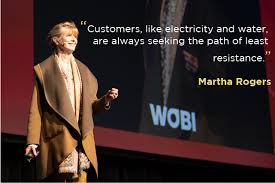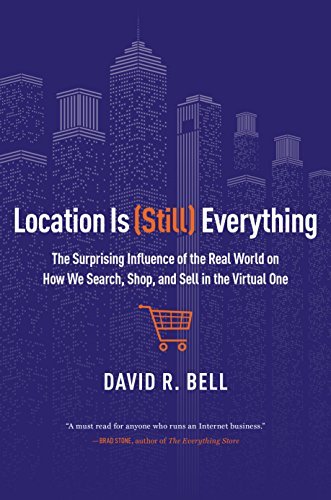by Barbara Harvey

World expert in digital marketing and the customer experience, Martha Rogers argues that in the 21st century the customer has the power. According to Moore’s law, explains Martha, computers get 1000 times more powerful every 20 years and customers become 1000 times more connected. And the more connected they are, the more powerful they can be. “The power of customers,” affirms Martha “is that they’re expecting more from marketers than ever.” The “customer experience” is certainly something businesses are talking about.
In fact, Martha affirms 90% of CEO’S expect to be competing on customer experience by 2021. But good intentions are not enough. Martha reveals that companies are not getting the customer experience right. In a recent study, 80% of CEO’S say their companies deliver excellent customer experience. Yet when the customers of those companies were surveyed, only 8% report experiencing excellent customer experience. That’s a large gap.
So what do consumers want and need? And how do you fulfil those needs? Martha suggests starting with a simple question: “What do customers want from you that they can’t get now at any price?” and “What is the industry norm and how can we bust that?” and “How can we manage the profitability of every customer we have?”
MARTHA ROGERS
Competing on Trust
One of the drivers of trust is transparency and the permanency of the internet. “You can’t un-google yourself” says Martha. This can be bad news for some but it is good news for ethics in business. Businesses now more than ever have to stay accountable and building trust has value too. “If the customer trusts you, then they believe they’re going to understand your point of view.” Which is important as it means the customer feels you are on their side.
Building Trust
Martha argues that building trust is what all marketers need to be thinking about. Martha presents that 84% of marketers say building trust is the most important marketing objective for the next 8 years. “Customers are no longer willing to put up with the things that companies have been getting away with for a long time,” says Martha. “Such as not reading the fine print or benefiting from something the customer doesn’t want.”
Losing Trust
Losing trust with customers can be catastrophic for business. In a study by Accenture, 54% of 7000 companies surveyed had incurred measurable costs of collectively $180 billion due to loss of customer trust via a trust incident. “A trust incident is any event or circumstance that results in the loss of real or perceived trust in a company.”
EXTREME TRUST- Review
Extreme Trust: Turning Provocative Honesty and Flawless Execution into Long Term Profits
by Don Peppers and Martha Rogers
Staying competitive today is all about trust. And in their latest book, “Extreme Trust: Turning Provocative Honesty and Flawless Execution into Long Term Profits” Don Peppers and Martha Rogers explain that it’s no longer enough to be considered trustworthy. Instead, the world of extreme trust calls for organisations to be proactively seeking the needs and interests of their customers to ensure their customers don’t make mistakes or miss the fine print. They call this being “trustable.” Understanding what it means to be “trustable” and how to achieve it will be a unique way for organisations to be disruptive. According to Peppers and Rogers most organisations are not acting in a way that they would define as “trustable.” So if you are looking at ways to edge ahead of your competitors or to engage more meaningfully with your customers, you need to read this book. Trust us.
DAVID R. BELL
A graduate of Stanford University and marketing professor at the University of Pennsylvania’s Wharton School, David is an award-winning teacher. His studies focus on how we use the Internet and related technologies to search, shop and sell – a subject he delves deep into in his best-selling book – “Location is (Still) Everything” (New Harvest, July 2014). He discovers that even in today’s interconnected digital world, location means everything.
David developed Wharton’s first course on digital marketing and e-commerce. His research articles have appeared in all major marketing journals, and his research has been recognised with numerous awards. When David spoke at the WOBI on Digital Transformation conference in Sydney this year, The Symes Report’s Barbara Harvey was lucky enough to catch up with him.
3 Questions for David Bell
The world of business is changing, and old paradigms are being challenged. What do you believe is the key to success in the future?
Thinking about business in terms of the elimination of friction is an amazing way to innovate. The idea of taking out friction is just so fundamental because the old economy is full of friction. In the old economy, if I want to know, should I stay at Hotel A or Hotel B, I would have to try and find somebody who stays there often, call them and ask them about their experience. But now you can find reviews on every product and service on the planet. You can open your phone and in a second, you will see some indication of the price and quality of those goods and services. So that search friction is totally dissipated.
You’re a world-renowned teacher and mentor. What does good business mentoring and teaching look like?
I think you have to do two things, I think you have to listen to people’s ideas, nurture them and tell them what’s right about their ideas. But I think the hardest part of mentoring is then questioning those ideas and challenging people about what might go wrong with their ideas. For me, that goes a little bit against my personality. But it’s about helping somebody to be better. For example, I had a very good student who took my class. He came to me one day and he had this wacky idea to build a direct to consumer bicycle company. I didn’t think too much of his idea. So, I told him frankly “Why don’t you go away and think about something that’s really salient to you as an individual. Think about what really frustrates you and then come back to me.” He came back a couple of weeks later and explained he was the father of twins and he really hated the stroller. It didn’t fold up properly…
And so now he’s the Founder of a direct to consumer baby stroller company. Obviously, he did all the work. But stories like that mean I really enjoy being a mentor. And now, of course, there is reverse mentoring. I am currently supporting a high school student and he’s the one teaching me stuff. He’s amazing. Digitally native, he reached out to me through his high school and a program to work with professors as mentors. And he’s been teaching me Facebook marketing, how to utilise Instagram properly, and other social media tools.
Think back over your career to date, what are you most proud of?
I did feel as a Professor I created some original content and some original ways of looking at digital marketing and the digital economy. When I started teaching this class in 2013, there were no textbooks so I had to cobble it together. That I think was something that I took ownership of. And then I think the other thing is being a Kiwi, growing up with three young brothers going and living in America, in New York City. I have an incredibly diverse set of friends, in age, career, cultural backgrounds, totally all over the map. They’re not all middle-aged academics! That’s something I’m quite proud of… I know a ton of really interesting people. And I think that’s just from growing up in New Zealand and being open to all kinds of people.
Location is (Still) Everything by David R. Bell
Based on extensive academic research and peppered with brilliant examples and case studies, “Location is (Still) Everything,” is a must have book for marketers and those interested in human behaviour around online shopping. As David says himself: “This book is for anyone who is curious about how and why we use the virtual world of the internet and its related technologies to shop.” Originally created as a one stop resource for business students to access examples and studies in the digital marketing space, the book’s thesis is presented via Bell’s beautifully simple GRAVITY framework and written in an accessibly conversational tone which makes it a joy to read. You will learn about the elements of real-world/virtual world integration and above all fundamentally understand that where we live influences our relationship with the internet, right down to which coffee we drink.
Barbara Harvey

